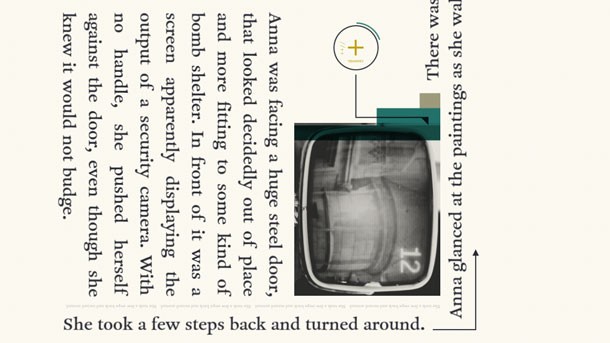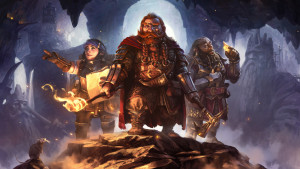Please support Game Informer. Print magazine subscriptions are less than $2 per issue
An Entry Guide To Visual Novels

The popularity of visual novels is on the rise in America. An increasing number of old and modern Japanese visual novels are being localized thanks to companies like Sekai Project, and Western developers such as Inkle are increasingly exploring the genre and expanding on it in the PC and mobile spaces. Visual novels are fascinating in that they rely heavily on text, but often use their visuals or design structure to engage the player and further advance their stories in ways that aren’t possible in traditional books.
If you’ve never experienced a visual novel and are uncertain about what they are, know that there are many different kinds, and many of those available in the U.S. include traditional gameplay components. Pure visual novels in the traditional sense often consist of clicking through dialogue boxes (as you see often in RPGs) or auto scrolling through the text. These traditional visual novels can feature voice acting and often provide dialogue choices that send you through different routes through the story. A majority of the visual novels in this guide are hybrids that are still text-heavy, but also feature gameplay components like puzzles or action scenarios. However, the focus is usually on the story and characters.
If you are curious about the genre and seeing its often amazing potential, this guide focuses on where to start. I’ve assembled it from my favorite visual novels, as well as with the input from the Game Informer editors and interns. Read on and you might just discover one of your new all-time favorite games.

Zero Escape: 999 and Virtue’s Last Reward
Platforms: 999 (DS, iOS*), Virtue’s Last Reward (3DS, Vita)
In 999, the protagonist is a college student named Junpei who is kidnapped from his apartment late at night by someone wearing a black jacket and a gas mask. He wakes up in an abandoned cruise ship that will sink in 9 hours. Eight other people have been brought there with him, and they are all asked to participate in the "Nonary game," with the prize being the right to escape. The narrative is broken up by a variety of escape-the-room puzzles, and the story diverges when you decide which of the puzzle rooms to tackle and the characters you bring into each room. The characters of 999 and its sequel, Virtue’s Last Reward, don’t adhere to standard archetypes and clichés, which makes you want to learn more about them and their motivations. Both novels feature different structures to enforce the themes of their story and use the medium to offer fantastic surprises.
*Note: Unless you absolutely have to, I don’t recommend 999 on iOS as that version strips away the puzzles and is weaker than the original DS experience. You will want to play 999 before its sequel Virtue’s Last Reward.

Phoenix Wright Ace Attorney series
Platforms: DS, 3DS, WiiWare, IOS, Android
The Ace Attorney series offers completely over-the-top courtroom drama and lovable characters. In the original game, you play as rookie defense attorney Phoenix Wright as he investigates crime scenes and argues his case in court. After you gather all your evidence, the main gameplay is in the courtrooms, where witnesses take the stand. The witnesses recount what they know, but inevitably their statements contradict the evidence. At that point you need to shout your objections and dismantle their argument via evidence and logic. My favorite part of the Ace Attorney series is how simple cases often evolve into scenarios far grander and crazier than they initially appear. As the stakes continue to rise, the infectious excitement grows. The characters that journey with you across the series make each adventure that much more enjoyable.

Frankenstein and 80 Days
Platforms: Frankenstein (IOS, Android), 80 Days (IOS, Android, Kindle)
Some developers like Inkle have remade classic stories as visual novels and have done so in fascinating ways. For example, Inkle’s Frankenstein has you playing as Victor himself as he creates his monster. Paragraphs of the story are presented to you, but you choose Victor’s responses to other characters in conversation, and the story develops from there. Inkle’s version of Around the World in 80 Days is very ambitious. 80 Days challenges you to navigate the world in 80 days, and if you’re online you can see the paths of others navigating across the globe. You get to meet and talk to people at all of the places you visit, which helps make each adventure your own and gives the game replay value.

Steins;Gate
Platforms: PC (coming to PS3 and Vita in 2015)
Steins;Gate is a time-travelling adventure with a very unusual protagonist. Rintaro Okabe is a self-proclaimed mad scientist, and he has unknowingly invented a time machine that can send text messages back in time. The sinister undertone of the story is delivered over time. Steins;Gate is one of the most pure visual novel on this list; it contains no gameplay whatsoever. The story does diverge in an interesting way, however, revolving around Okabe’s cell phone. If you get a phone call or a text message, you can ignore it or choose how to answer it. You learn about the many different characters and unravel the overarching mystery of the story depending on how you respond to others. Steins;Gate is a fantastic visual novel, and it also has a very good anime adaptation that’s worth checking out.
Up next: Danganronpa, Gamebooks, and more...

Danganronpa Trigger Happy Havoc and Danganronpa 2 Goodbye Despair
Platforms: Vita
The Danganronpa games offer a disturbing premise and execute it very well. Sixteen of the Ultimate Students are kidnapped and told they have to kill one another in order to escape. You walk around and talk to your classmates to get to know them in a system similar to Persona’s Social Links. Inevitably, a dead body turns up, and it’s up to you and your classmates to find the culprit. During the class trials, the main focus of the game, you must piece together how the murder was committed and why in order to discover the murderer. Getting to know each of the characters, working through each shocking plot twist, and piecing together the greater lore between the games is incredibly engrossing.

BlazBlue and Persona 4 Arena
Platforms: BlazBlue series (PS3, Xbox 360, PSP, 3DS, Vita and coming soon to PS4 and Xbox One), Persona 4 Arena and Persona 4 Arena Ultimax (PS3 and Xbox 360)
Make no mistake, both the BlazBlue and Persona 4 Arena series (by Arc System Works) are first and foremost excellent hardcore fighting games, but both feature very lengthy story modes (often 30 to 40 hours long) presented as visual novels (often with multiple branching paths and endings). Fighting matches break up the story sections, although the more recent games in each series have pared down the number of bouts. The flexibility and variability of the scenarios in both games’ story modes are fantastic because they do a great job developing and highlighting each member of their large casts so that you never feel your favorite characters are left out of the spotlight. Of the two series, I prefer BlazBlue’s story mode overall since it features fantastic original characters and does more with the format. However, Persona 4 Arena features a familiar cast and is a good jumping-on point for the genre for Persona fans.

Sorcery! and Lone Wolf
Platforms: Sorcery (iOS, Android and Kindle), Lone Wolf (iOS)
Both Inkle’s Sorcery! and Forge Reply’s Lone Wolf are visual novel adaptations of gamebooks. The original gamebooks provided an experience similar to D&D – all in one package. In both the visual novel adaptations of Sorcery! and Lone Wolf, you are reading pages of the story of your adventure and must occasionally participate in RPG combat. Each game is cool because you still get the benefits of the narrative text, but the combat is far easier to handle since they present all of the information to play in an intuitive way.

Hate Story, Don’t Take It Personally, Babe, It Just Ain’t Your Story, and Digital: A Love Story
Platforms: All three on PC, Mac, and Linux
In the last few years, Christine Love has been creating interesting visual novels that tackle human relationship issues in conjunction with the impact of modern technology. Her novels often feature LGBTQ characters and dating-sim mechanics. The premise of her stories is often unique and begs you to explore them. For example, Don’t Take It Personally, Babe, It Just Ain’t Your Story is about roleplaying as a teacher who can view all of the posts on a classroom social media message board, even the private ones, and must decide how to use that information for better or for worse. In Hate Story, the protagonist journeys to a devastated colony ship that adopts the structure of a medieval South Korean society consisting solely of two A.I. personalities developed before and after the society’s collapse. Two of her most popular visual novels, Digital: A Love Story and Don’t Take It Personally, Babe, It Just Ain’t Your Story, are free to download.

Device 6
Platforms: iOS
Device 6 is both a visual novel and a puzzle game developed by Simogo. In order to advance through the story, you read text, swipe through it, click on pictures, and even rotate your iPhone or iPad. The text is cleverly arranged so that it mimics how the protagonist moves in the story. If the character you are reading about turns around, you’ll need to rotate your device in order to simulate the action. Device 6 also plays heavily with sound to evoke an ominous vibe and to establish the atmosphere of each scene. For example, if you walk outside you’ll read about it, but also hear the door screech and the sounds of birds chirping. In addition to the protagonist’s journey, Device 6 addresses you as a player throughout the game; adding a meta-narrative to the story.
For more on visual novels be sure to check out Kim Wallace’s thoughts on the state of the genre in early 2014 and be sure to share your experience with visual novels in the comments below!










